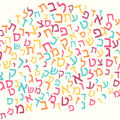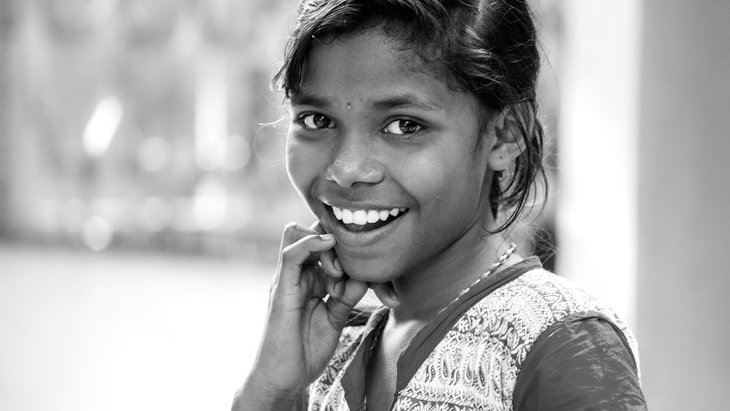 You Know More Hebrew Words Than You Think
You Know More Hebrew Words Than You Think


10 min read
The Jewish recipe for living with gratitude.
Although it was my second extended period helping out at this Calcutta orphanage, I still marveled at the standard of living of the girls. Growing up, I had had my own room; these girls didn't even have their own beds. They slept on thin mattresses spread on the floor, two girls to a mattress, sharing a blanket and a mosquito net. During the day the mattresses were piled up in a corner, and the room was used for play and doing homework.
Their only private space amounted to a box the size of a large shoe box. In this box each girl kept all her worldly possessions: the one of her two cotton frocks she was not currently wearing, two pencils, and a copy book. About 25 of the girls owned a pair of sandals, which they trotted out on special occasions. About a dozen girls owned a pretty dress, a gift from an impoverished grandmother. That that was it. No other garments. No toothbrush. No crayons. Not one girl owned enough to fill her box. Yet they were the most cheerful and loving group of people I knew. I adored them.
The girls prevailed on me to teach them English. One day we were on the lesson in our book about opposites: tall-short, thin-fat, rich-poor. After explaining the words in simple English, I would have one girl stand in front of the class and ask, "Is Bhavani thin, fat, or medium?"
The girls would raise their hands, and the one I picked would answer: "Bhavanai is thin."
The girls were smart and highly motivated. The lesson was proceeding well until I summoned Lakshmi to stand in front of the class. Pointing to the scrawny, barefoot girl in her plain white frock, I asked, "Is Lakshmi rich, poor, or medium?"
Two dozen hands flew up. I called on one girl. In loud and perfect English she answered: "Lakshmi is medium."
Obviously she didn't understand the words. Lakshmi, like all the girls, was abjectly destitute, a reality they all accepted with cheerful fortitude. I called on another girl. Eagerly, she replied, "Lakshmi is medium."
I again explained the meaning of the words "rich" and "poor," this time using their Bengali translations so there would be no further misunderstanding. Then I asked the whole class: "Is Lakshmi rich, poor, or medium?"
In joyful unison they all cried out: "Lakshmi is medium."
I was confounded. By what mental gyrations did these girls consider Lakshmi - and by extension themselves - as anything other than poor?
After the class, I repaired to my room (my own private room) and tried to figure it out. After all, the girls knew that most children, even in poverty-stricken Calcutta, had more than they did. They attended school with "normal" girls - girls who had parents and shoes and pretty colored ribbons in their hair.
Carefully I analyzed what exactly they did have. I came up with a list of just four items: a rudimentary level of shelter, food, education, and friends. That was it.
But what about all they didn't have? Not one of them had a dowry, without which prospects of marriage were slim. None of them owned a book or a toy. None of them had money to buy a treat or a trinket - ever. By what stretch of their imaginations - or their hearts - did they not define themselves as poor? The question simmered in my mind for a decade.
JUST DESSERTS
Ten years later I was learning Torah in Jerusalem. The Rabbi was explaining why the matriarch Leah named her fourth son Yehuda, a name derived from the word "to thank." Since the moniker "Jew" derives from the name "Yehuda," thanking is somehow integral to being Jewish.
But why did Leah wait until her fourth child to use this name? Wasn't she more grateful for her first child than her fourth?
Gratitude is a function not of how much we have, but rather of how much we have relative to how much we feel we deserve.
The Rabbi, citing classical commentators, explained that Jacob's four wives knew prophetically that they would give birth to the twelve sons who would become the progenitors of the twelve tribes of Israel. Since there were four wives, each one expected to give birth to three sons.
When Leah gave birth to her fourth son, she felt that she had received more than her fair share. So she named him Yehuda, saying, "This time I will thank God."
This teaches us something essential about gratitude. Gratitude is a function not of how much we have, but rather of how much we have relative to how much we feel we deserve.
When you have worked hard at your job, you usually do not feel flooded with gratitude when you pick up your paycheck. Even a holiday bonus may come to be expected as your just desserts and not elicit a great surge of gratitude - unless it is a far bigger sum than you feel you deserve.
The opposite of gratitude is a feeling of entitlement. The attitude of "I deserve it" turns every gift into a paycheck.
RECOGNIZING GOOD
The Hebrew term for gratitude is "hakarat hatov," which literally means, "recognizing the good." The secret embedded in the Hebrew is that gratitude depends not on getting something good, but on recognizing the good that is already yours.
Thus, gratitude is totally a feat of consciousness. It requires a "back to basics" mentality, becoming cognizant of all the rudimentary things we usually take for granted. No matter how much we lack, no matter what difficult times we are passing through, every one of us can find a myriad of things to be grateful for.
If you've lost money in the stock market, but you still have your children, you can be grateful.
If you've lost your job, but you still have your health, you can be grateful.
If you can't move your legs, but you can move your arms, you can be grateful.
THE OBJECT OF GRATITUDE
In addition to recognizing the good and experiencing what you have as a gift not a paycheck, gratitude requires one more ingredient.
There is a fallacy which prevents many people from experiencing true thankfulness. Some think that thankfulness, like love, is a warm, fuzzy feeling inside, the way you feel when you've downed the second dessert of your Thanksgiving dinner. That good feeling, however, is not thankfulness, but satiation. It becomes thankfulness only when you realize that Aunt Rose toiled to make that apple pie, and you direct your appreciation to her.
Both thankfulness and love must have an object. True gratitude implies that I am grateful to the giver of what I have received. Gratitude without an object is like one hand clapping.
Gratitude without an object is like one hand clapping.
From a Torah perspective, all human beings are creatures. Life - and every part of it from the tiny hairs inside our noses to our thousands of enzymes - is a gift from our Creator. We are entitled to nothing. We are grateful to God for everything.
A RECIPE FOR GRATITUDE
Here, then, are the 4 steps to gratitude:
The Pilgrims of the first Thanksgiving obviously traversed these four steps. They were grateful not for their high standard of living, but simply that they had survived their first winter in the New World. Deeply religious people, they felt gratitude to God. The first Thanksgiving feast was their way of expressing that gratitude to God.
According to Judaism, gratitude is the basis of everything: faith, joy, awe, and love of God. Only when we recognize how much God has given us and how little we deserve it, can we come to a place of faith and love.
Little wonder that a Jew is supposed to start every day with an expression of thankfulness for life itself, the recitation of the modeh ani. If you want to incorporate this small exercise into your life, here is how to do it:
Upon first waking up, as soon as you've turned off your alarm, while you're still lying in bed, say these words: "Modeh ani lefanecha Melech chai v'kayom, shehechezarta bee neshmati b'chemla, rabba emunasecha." In English, it's: "Thankful am I before you, living and eternal King, that you have returned my soul within me with compassion, abundant is Your faithfulness."
You'll notice that this single sentence incorporates all the ingredients of gratitude. It expresses thanks for the most elemental gift of all, life itself, to the divine source of life. There is no better way to start one's day.
Once we are washed up and dressed, a Jew continues to thank God for things which might otherwise go unnoticed. The 14 short "Morning Blessings" focus our consciousness, in gratitude, on such elemental capacities as the ability to see, to stretch our muscles, to stand erect, and to walk. These blessings can be found at the beginning of any siddur, Jewish prayer book, which are readily available in any Jewish bookstore.
Some of these blessings are easy to feel genuine gratitude for. We may be so oblivious to others of our "gifts," however, that we must be jolted into appreciation.
I personally could not relate to one particular blessing until the morning after I had emergency abdominal surgery. I was lying in my hospital bed groaning in pain when the nurse told me to get up and walk a little. I thought she was insane. Only when her gentle persuasion gave way to insistence, did I force myself to sit up and gingerly get out of bed, wrenching with agony at every movement. Standing up, the most I could manage was a stooped shuffle across the room. The nurse kept saying, "Stand up straight," but my abdomen hurt too much.
It has been 4,745 days of standing up straight and thanking God for it every time I say that blessing.
Then it was time for my morning prayers. Standing next to my bed like a hunched over nonagenarian, when I got to the blessing, "Blessed are You, Hashem our God, King of universe, who straightens the bent over," I almost cried. How had I never related to this blessing before? How had I so taken for granted the "simple" faculty of standing erect? Why did I have to lose this ability before I could appreciate it? It has been exactly 13 years since that morning, 4,745 days of standing up straight and thanking God for it every time I say that blessing.
Ethics of Our Fathers teaches us: "Who is rich? The one who is happy with his portion."
My Indian orphans understood all this. Feeling that they deserved nothing, they experienced the little that they had as a pure gift. No wonder they couldn't define themselves as poor.
They would have agreed with Jewish tradition that thanksgiving is too precious to be reserved for one day a year.
Photo credit: Loren Joseph, Unsplash.com
This article is featured in Aish.com's book:
Heaven on Earth.
Buy it now!
